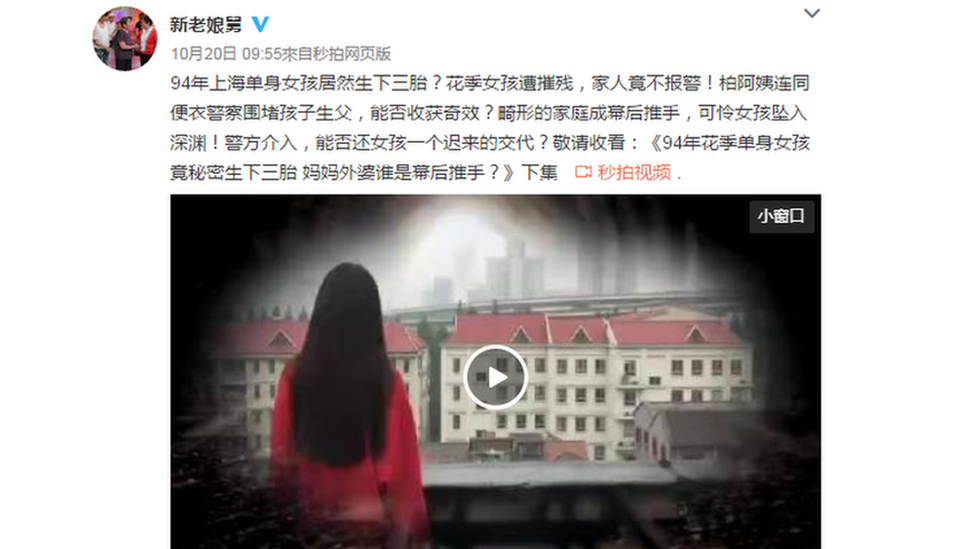Did a story about rape take down a Chinese TV show?
- Published

In the two episodes, Qian Qian's grandmother and mother told the host they didn't report to the police when Qian Qian was raped multiple times
A popular TV show in China has been cancelled after featuring the mother and grandmother of a vulnerable young woman who was allegedly repeatedly raped, but never reported it. The BBC's Grace Tsoi explains the outcry and why rape victims in China are so reluctant to come forward.
Xin Lao Niang Jiu is a Chinese television programme similar to the Jerry Springer Show, and a huge hit among middle-aged and older audiences in Shanghai. In the show, hosts mediate in salacious family conflicts, for example, a husband who insists on sleeping in his mother's bed.
But it is now off air following a massive public outcry over two episodes aired on 19 and 20 October.
The episodes had on the couch the mother and grandmother of 22-year-old Qian Qian (not her real name) and they described how she was raped by three men at the age of 17. They went on tell how she was raped again two years later by a taxi driver. According to their testimony, he was able to rape her repeatedly and she bore him two children.
"We dared not call the police. First, we didn't have money. Second, we didn't know anybody from the police station," the grandmother said when the host asked her why they didn't turn to the police for help.
Power of public anger

Netizens have been enraged by the two episodes of Xin Lao Niang Jiu which centred on the story of a 22-year-old girl whose families never reported her rapes
It unleashed a tide of fury against the two older women and the programme. It was clear to viewers that the young woman had a troubled upbringing and serious mental health issues.
The show made no official comment about its cancellation, but a staffer told the BBC it was because of a "change in programmes". Local media cited a document from a Shanghai broadcast body dated 24 October, which said it was cancelled because of a "negative case".
Most of the condemnation on social media and mainstream media focused on the mother and grandmother - they were "uneducated and misguided" and "their behaviour was inexcusable". Others questioned the authenticity of the case. But what many called the show's "exploitative" nature was not spared public rage.
Broadcast by the Shanghai Media Group, Xin Lao Niang Jiu claims every case featured is real and handled appropriately. The BBC was not able to verify the particulars of this case after making multiple attempts to contact Shanghai police.
But amid the anger towards the the mother and the women, only a few considered the reality for women who undergo such ordeals in China.
Unreported rapes are common
Qian Qian's experience might have been hard for some to believe, but experts say it is fairly common for rape and sexual abuse victims and their families not to seek help from the authorities.
There are few official statistics and national-level studies looking into rape and sexual violence in China, said Edward Chan Ko-ling, a social work professor at the University of Hong Kong.
But according to one of his studies in 2013 which interviewed more than 14,000 students in five Chinese cities, 6.1 percent of girls aged between 15 and 17 reported that they had been sexually abused by an adult. In a 2013 United Nations study, 8.1 percent of male respondents in China said that they had raped a non-partner.

Weibo account of Xin Lao Niang Jiu
So the programme both exposed and touched a raw nerve in Chinese society.
Lu Xiaoquan, an associate director of Qianqian Law Firm which provides legal aid for women, argues the stigmatisation of victims is crucial.
"In Chinese traditions, men enjoy a higher status than women… If a girl is sexually abused, her neighbours, teachers, relatives, guardians and parents may think that she has become impure," the Beijing-based lawyer said.
Unhelpful system
Mr Lu said some people believe that reporting rape and sexual abuse to authorities will damage the reputation of the victim and her entire family.
"People don't have faith in the system, including the police and the legal system. They also doubt whether there are helpful health and social services professionals," Mr Chan said.
Lack of police training is also an issue.
"It's only reasonable that police officers with appropriate training are allowed to handle such (rape and sexual violence) cases… Currently, all police officers can handle these cases," Mr Lu said.
Compensation at a cost
Under China's legal system, it is hard for adult rape victims to prove their case.
Mr Lu said it is unlikely police will start investigations if no preliminary evidence, such as underwear and clothing with the perpetuator's semen, is provided. Even if victims have gathered definitive proof, compensation is another factor that makes rape victims and families reluctant to seek justice.
"Current laws stipulate that the convicted do not need to pay a penny for victims' psychological damages," Mr Lu said.

Tang Hui (pictured) sought punishment for her daughter's rapist but was sent to a labour camp instead, capturing national attention
Many victims opt to resolve the case privately because they can probably get more compensation, but that comes at a cost.
"Suspects will be able to walk free. They may commit more crimes and more women will be harmed."
It is not certain that those episodes drove Xin Lao Niang Jiu off air, but it seems likely. Some are glad to see a "vulgar" programme go, but others say the ban is irrelevant.
"The dark side of society exists, and it won't disappear just because a television show is cancelled. Other than cancelling a show, it is much better if we should shed light on social problems," said Weibo user Luan Zhong Dao.
Additional reporting by Zoe Chen